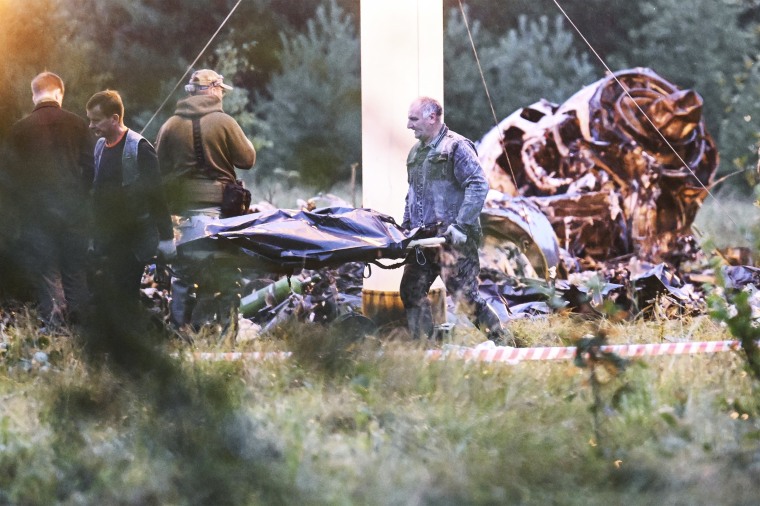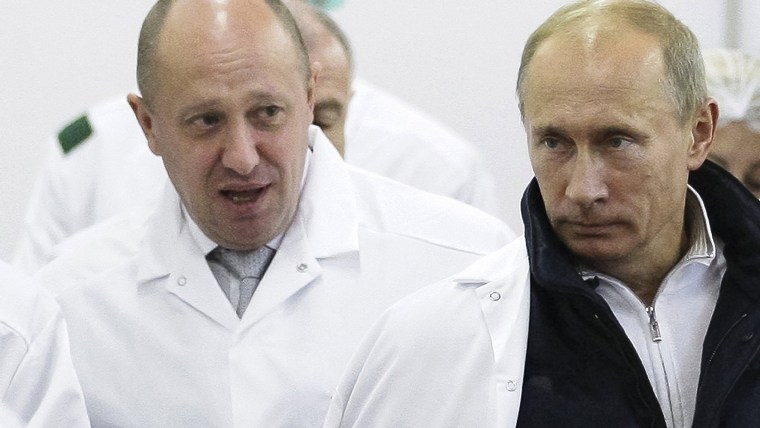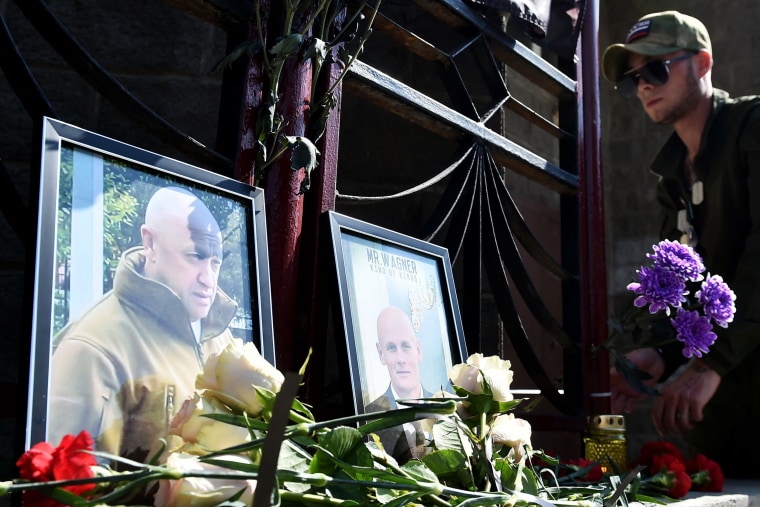It was both shocking and predictable.
Two months to the day after Yevgeny Prigozhin launched a brief armed rebellion that threatened the Kremlin’s authority, the mercenary chief and some of his top lieutenants were listed aboard a plane that crashed with no survivors.
The truth of Wednesday’s incident may never be widely known. But the signal — to Russian elites and to the world — was viewed by many analysts as blazingly clear in the field outside Moscow: Russian President Vladimir Putin is trying to show that his rule remains unshaken and that no challenge will go unpunished.
“Russia’s reputation for deceit, cruelty and violence is so widely accepted that nobody for one second thought that this was an accident,” retired Lt. Gen. Ben Hodges, former commander of U.S. Army forces in Europe, told NBC News. “We all automatically assumed it was either a hit or staged.”
Brig. Gen. Pat Ryder, the Pentagon’s press secretary, said at a briefing Thursday that the Defense Department’s initial assessment is that Prigozhin was likely killed. He added that there is no information to indicate a surface-to-air missile hit the aircraft, pushing back at reports suggesting it as the cause of crash.
Two U.S. officials told NBC News intelligence gathered so far points to sabotage. One of the officials said a leading theory is that the aircraft was downed by an explosive on board, but they do not have enough information to say that with certainty.
 The jet's wreckage was found near the Russian village of Kuzhenkino, where authorities said the bodies of all 10 on board had been recovered.AP
The jet's wreckage was found near the Russian village of Kuzhenkino, where authorities said the bodies of all 10 on board had been recovered.AP‘Only a question of time’
President Joe Biden had said in July that if he were Prigozhin, “I’d be careful what I ate.” After the news of the jet’s crash, Biden likely echoed the thoughts of many: “I’m not surprised,” he said, adding “There is not much that happens in Russia that Putin is not behind.”
Indeed, Prigozhin would not be the first person to fall — or plunge — out of Kremlin favor and die in suspicious circumstances.
German Foreign Minister Annalena Baerbock told a news conference Thursday that the incident followed a “pattern in Putin’s Russia: deaths, dubious suicides, falls from windows,” which “underlines a dictatorial power system that is built on violence.”
The Russian president once said he could never forgive betrayal. So even after Prigozhin called off his mutiny and Putin appeared to show him rare leniency with the offer of exile, most observers agreed the Wagner leader’s days were numbered.
Prigozhin “was always a threat and a reminder that Putin is weak,” Orysia Lutsevych, head of the Ukraine Forum at London’s Chatham House think tank, said in an email. “It was only a question of the time and mode of Prigozhin’s elimination.”

'Revenge served cold' suspected in plane crash death of Putin warlord
The Kremlin was silent Thursday on the crash.
The incident only received a brief mention on Russia’s state-owned news channels, and Putin himself did not mention it during two public speeches.
Whether or not the Kremlin was involved, the Russian state won’t mind the implication that it was, according to Tatiana Stanovaya, a nonresident scholar at the Carnegie Endowment for International Peace and the founder and head of the political analysis firm R.Politik.
“No matter what caused the plane crash, everyone will see it as an act of vengeance and retribution,” she said in a post on the messaging app Telegram. “The Kremlin wouldn’t really stand in the way of that.”
Stanovaya added that, “Prigozhin’s death must be a lesson to any potential followers.”
It is the latest extraordinary event in a period of upheaval for Putin’s Russia.
Prigozhin was once one of the president’s most trusted fixers, going from providing catering services to building his own private army, the Wagner Group, which has been blamed for doing Russia’s brutal dirty work across Africa, Syria and, most recently, Ukraine.
While Wagner has been involved in some high-profile successes of an otherwise troubled invasion, Prigozhin has also been deeply critical of the Russian army, accusing its elites of corruption and failing to supply his forces with ammunition.
This came to a head two months ago when he called for the resignation of military generals, before marching toward Moscow and engaging in deadly clashes with Russia’s own military along the way.
The rebellion was Putin’s biggest leadership crisis yet. Even when Prigozhin relented, the bell of his open challenge against the Kremlin could not be unrung.
 A makeshift memorial was set up in front of the Wagner office in the Siberian city of Novosibirsk on Thursday, even as Prigozhin's fate remained unconfirmed.Vladimir Nikolayev / AFP – Getty Images
A makeshift memorial was set up in front of the Wagner office in the Siberian city of Novosibirsk on Thursday, even as Prigozhin's fate remained unconfirmed.Vladimir Nikolayev / AFP – Getty ImagesThe only reason Putin kept Prigozhin around was so the Kremlin could dismantle Wagner without provoking further mutiny, Stanovaya said. But to have him walking around, “alive, happy, full-of-strength and full-of-ideas” was “the embodiment of Putin’s political humiliation,” she said.
Russian Defense Minister Sergei Shoigu and Gen. Valerei Gerasimov, head of the war in Ukraine, were targets of the Wagner chief’s frequent public fury and aborted mutiny. They now appear to have been strengthened quite dramatically — at the expense of Wagner.
Prigozhin’s supporters would likely be “more scared than inspired to protest,” Stanovaya said.
But while the Kremlin may have reasserted its authority, the extent to which Putin has put an end to his troubles and defanged the mercenaries is unclear.
Prigozhin was “a true patriot of his motherland” who “died as a result of actions by traitors,” a message posted by the Wagner-affiliated Telegram channel Gray Zone said late Wednesday.
Hodges, the former U.S. commander in Europe, is among those who believe Prigozhin’s death would be a symptom of further chaos and destabilization within the Russian state. “I anticipate that things in Russia are going to deteriorate,” he said. “Those in power hate each other. They don’t trust each other.”
Putin himself spent Wednesday evening at a ceremony marking 80 years since the then-Soviet Union’s victory against Nazi Germany at the Battle of the Kursk, a famous World War II tank exchange.
He handed out medals to Russian soldiers who have been fighting in Ukraine, all while the private jet believed to be carrying his once loyal enforcer burned near the capital.
If it was intended as a symbolic juxtaposition, it was a powerful one.




